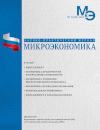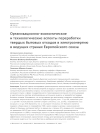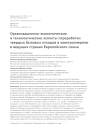Organizational, economic and technological aspects of processing solid household waste into electricity in the leading countries of the European Union
DOI: 10.33917/mic-1.108.2023.74-84
This article discusses the organizational, economic and technological aspects of the processing of MSW into electricity in the leading EU countries under economic sanctions. The issues of using and applying foreign, in particular German experience in the field of state incentives for companies to use renewable energy sources in the energy sector and the processing of municipal solid waste were considered. It has been established that over the past three decades, the consumption of brown coal in the fuel and energy complex of Germany has decreased from 21 to 8%, hard coal from 15 to 8%, and the use of nuclear energy has decreased from 11 to 6%, while gas consumption has increased from 11 to 25%. It has been revealed that over the past few years Germany has been the leader in the EU in terms of MSW recycling and the share of waste return to the economic turnover in Germany is 66%, while in the EU countries this figure does not exceed 46% on average. In particular, in Germany, electronic industry waste is 100% recycled, and waste paper, cardboard and glass are recycled by more than 85%. The German technology of MSW processing is analyzed, which allows the most efficient use of organic waste for the production of renewable energy sources, including biogas and fertilizers for agriculture.
References:
1. Alekseev A.E., Novitsky I.Yu., Zhenzhebir V.N., Pshava T.S., Shestov A.V. International globalization and transformation of the concept of energy security. Online journal of Science Studies. 2015;7(6(31)):2. (In Russ).
2. Alekseev A.E., Novitsky I.Yu., Zhenzhebir V.N., Pshava T.S., Dadugin M.V. Energy security in the European Union: problems of «dependence» and development. Online journal of Science Studies. 2015;7(6 (31)):3. (In Russ).
3. Bondarenko A.M., Kachanova L.S., Chelbin S.M. Technological bases of the production process of humic organomineral fertilizers. Far Eastern Agrarian Bulletin. 2022;16(4):93-99. (In Russ).
4. Bondarenko A.M., Kachanova L.S., Baryshnikov A.V. Determination of technological and design parameters of a brush auger for processing liquid manure as part of a mobile installation. International Agricultural Journal. 2022;65(3). (In Russ).
5. Vukovich N.A., Polyanskaya O.A. Bioenergy as a driver of green economy development in Russia. Beneficiary. 2020;4 (37):4-10. (In Russ).
6. Gromova O.N., Papoyan A.N. Experience of organization of solid household waste management abroad. Journal of Management Studies. 2019;5(2):3-6. (In Russ).
7. Golovanov V.I. The role of ecology in the sustainable development of society: dialectics and retrospective. Monograph. Moscow, Publishing House: LLC «MAX Press», 2021.
8. Golovanov V.I., Kirnarskaya S.V., Anfimova A.Yu. Prospects for the implementation of programs for the collection and processing of household waste. In the collection: Strategic directions in the regions: ecological, economic and social aspects. Materials of the international scientific and practical conference. Editor-in-chief: A.V. Antonov, 2019. pp. 180-189.




